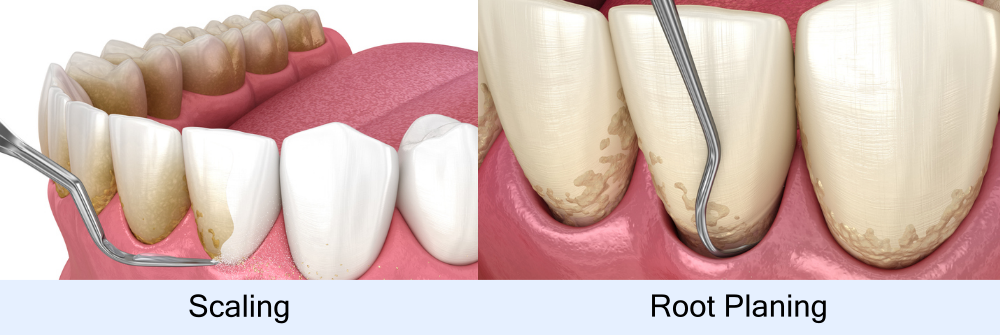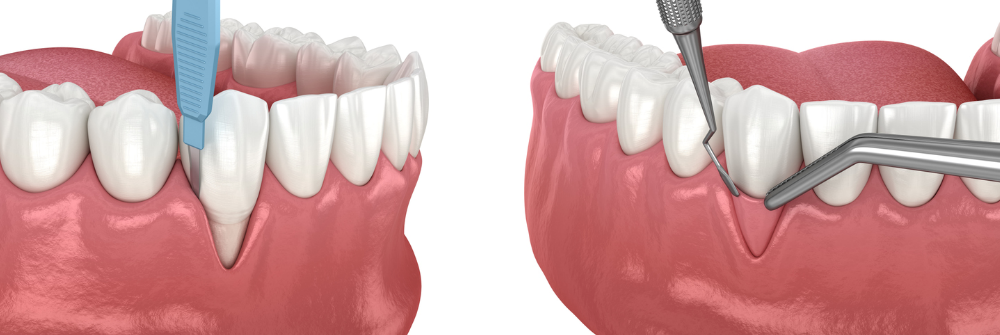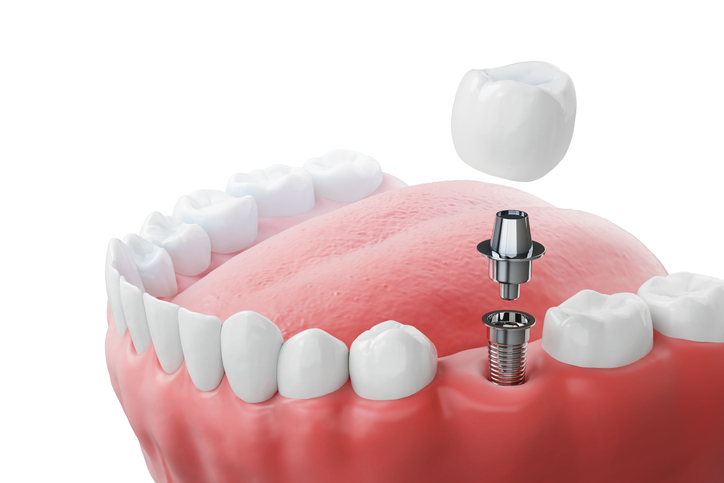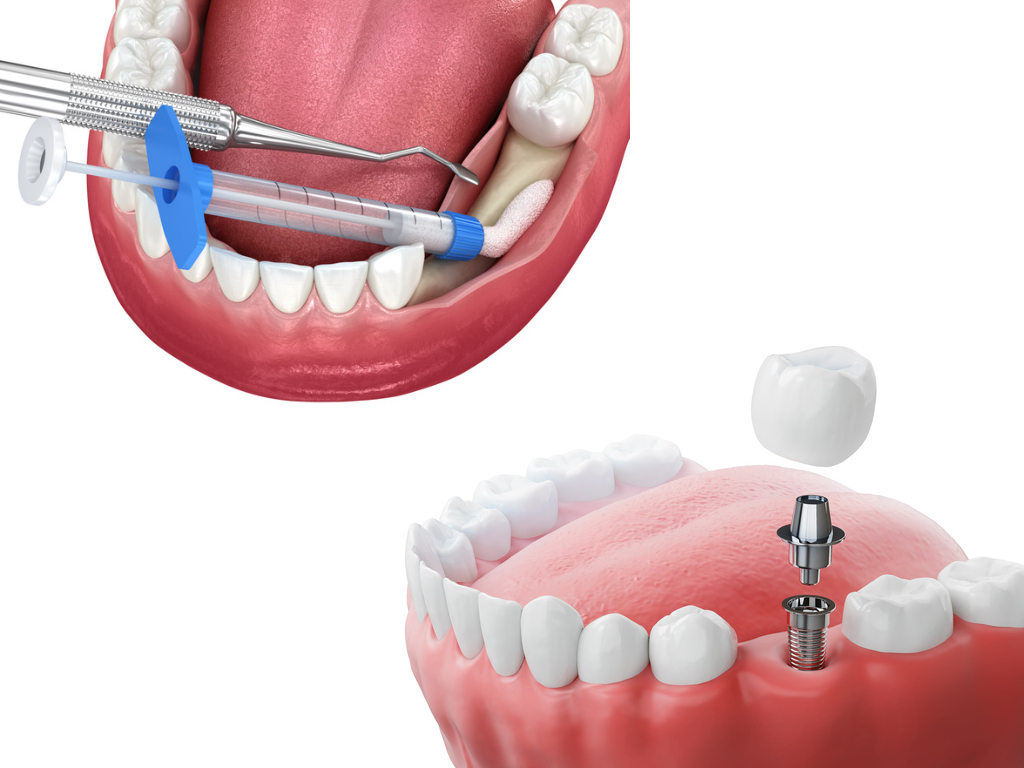Periodontists are dental specialists who focus on the prevention, diagnosis, and treatment of gum diseases and conditions affecting the tissues that support the teeth. While their role might seem mysterious to some, their work is vital for maintaining overall oral health. Healthy gums are the foundation of a beautiful smile and contribute significantly to general well-being.
In this post, we will talk about some of the procedures that periodontists perform and why these procedures are necessary.
Common Periodontist Procedures
Deep Cleaning (Scaling and Root Planing)
Periodontitis, a severe form of gum disease, can cause inflammation, bleeding, and even tooth loss if left untreated. Deep cleaning, also known as scaling and root planing, is a non-surgical procedure aimed at removing plaque and tartar from below the gum line. By smoothing the tooth root surfaces, this procedure helps gums reattach to the teeth, preventing further damage.

Gum Grafting
Receding gums affect aesthetics and expose tooth roots, making them susceptible to decay and sensitivity. Gum grafting involves taking tissue from elsewhere in the mouth or using donor tissue to cover exposed roots, enhancing both appearance and function. This procedure is also crucial for patients undergoing dental implant placement, as it ensures sufficient gum tissue for proper implant support.

Dental Implants
Missing teeth can lead to various issues, including bone loss and shifting of adjacent teeth. Dental implants offer a durable and natural-looking solution by replacing tooth roots and supporting prosthetic teeth. Dr. Scharf plays a vital role in the implant process, from initial assessment to placement and post-operative care. He also manages gum tissue around implants to ensure long-term success.

Laser Gum Treatment
Laser technology has revolutionized periodontal therapy by offering a minimally invasive alternative to traditional gum surgery. Laser gum treatment targets and eliminates diseased tissue while preserving healthy gums, resulting in reduced discomfort, bleeding, and faster recovery times. This approach is particularly beneficial for patients with moderate to severe gum disease. One such laser treatment is LANAP.
LANAP (Laser-Assisted New Attachment Procedure) is an innovative and minimally invasive treatment for gum disease. It utilizes laser technology to target and remove diseased gum tissue while preserving healthy tissue.
Periodontal Pocket Reduction
Periodontal pockets form when gum tissue pulls away from the teeth, creating spaces where bacteria can accumulate and cause further damage. Periodontal pocket reduction, also known as flap surgery or pocket depth reduction, is a surgical procedure aimed at reducing pocket depths and eliminating bacteria. During the procedure, the periodontist lifts the gum tissue to access the roots for thorough cleaning and removal of tartar deposits. In some cases, irregular surfaces of the damaged bone may also be smoothed to facilitate gum reattachment. By reducing pocket depths and promoting gum reattachment, this procedure helps prevent disease progression and promotes periodontal healing.
While many periodontists perform pocket reduction surgery, Dr. Scharf offers a more advanced approach to treating gum disease. He utilizes LANAP, as described earlier.
Hard and Soft Tissue Reconstruction
Advanced gum disease or trauma can lead to significant damage to both the gums (soft tissue) and the underlying bone (hard tissue). Periodontists are skilled in performing reconstructive procedures to restore the health and aesthetics of the gums and bone. Soft tissue grafting techniques, such as connective tissue grafts or free gingival grafts, are performed to augment thin or receding gums, improving their appearance and resilience. Dr. Scharf uses a better technique that is less invasive and heals quicker. It is called the Pinhole Surgical Technique or pinhole technique.
The Pinhole Surgical Technique (PST) is a minimally invasive procedure used to treat gum recession, a condition where the gum tissue surrounding the teeth wears away, exposing the tooth roots. During PST, a small incision or “pinhole” is made in the gum tissue above the affected teeth. Special instruments are then used to gently loosen and reposition the existing gum tissue to cover the exposed tooth roots. This technique does not involve any grafts or sutures, and multiple teeth can be treated in a single session. PST offers advantages such as minimal discomfort, fast recovery, and immediate cosmetic improvement, making it an attractive option for patients seeking gum recession treatment.
In cases of bone loss, procedures like bone grafting or guided tissue regeneration may be employed to rebuild lost bone support around teeth or dental implants. These techniques involve the placement of bone graft materials or membranes to stimulate new bone growth and restore structural integrity. By addressing both hard and soft tissue deficiencies, Dr. Scharf can enhance the overall stability and aesthetics of the oral environment, ensuring long-term oral health and function.

When to See a Periodontist
If you’re concerned about your gums and overall oral health, seeing Dr. Scharf is a good idea. Here are a few times when it might be a good idea to make an appointment:
Gum Disease Symptoms: If you notice any signs or symptoms of gum disease, such as redness, swelling, tenderness, bleeding gums (especially during brushing or flossing), persistent bad breath, or loose teeth, it’s important to seek evaluation and treatment from Dr. Scharf. Early detection and intervention can prevent gum disease from progressing to more severe stages and potentially causing tooth loss.
Receding Gums: Receding gums, where the gum tissue pulls away from the teeth, exposing the roots, can lead to tooth sensitivity, aesthetic concerns, and increased susceptibility to decay. Dr. Scharf can assess the extent of gum recession and recommend appropriate treatment options, such as gum grafting or the Pinhole Surgical Technique (PST), to restore gum health and prevent further recession.
Tooth Loss or Missing Teeth: If you are considering tooth replacement options such as dental implants, consulting with Dr. Scharf is essential. Periodontists specialize in implant dentistry and are trained to evaluate your oral health, assess bone density and gum tissue quality, and plan and perform implant placement surgeries to ensure successful outcomes.
Persistent Halitosis (Bad Breath): Chronic bad breath that persists despite proper oral hygiene practices may indicate an underlying gum infection or other oral health issues. Dr. Scharf can diagnose and treat the root cause of bad breath, whether it’s related to gum disease, oral infections, or other factors, to help you achieve fresher breath and better oral health.
Family History of Gum Disease: If you have a family history of gum disease or other periodontal conditions, you may be at a higher risk of developing similar issues. Regular check-ups with Dr. Scharf can help monitor your gum health and implement preventive measures to reduce the likelihood of gum disease progression.
Dental Referral: Your general dentist may refer you to Dr. Scharf if they suspect or diagnose gum disease or other periodontal issues during your routine dental exams. Following your dentist’s recommendation and seeking specialized care from Dr. Scharf can ensure comprehensive management and treatment of your oral health concerns.
Maintaining optimal gum health is crucial for a confident smile and overall well-being. Periodontists play a vital role in preserving and restoring gum health through various specialized procedures. By recognizing the signs of gum disease and seeking timely treatment, individuals can safeguard their oral health and enjoy a lifetime of healthy smiles. Remember, regular dental checkups and good oral hygiene habits are essential for preventing gum disease and minimizing the need for periodontal interventions.
Addressing Common Concerns and Anxieties
We understand that considering periodontal procedures can bring up various concerns, but we want to assure you that our team at Dr. Scharf’s office is here to support you every step of the way. Here’s how we address some common concerns:
1. Comfort during Procedures: We prioritize your comfort throughout any periodontal procedures you undergo. Our experienced periodontists utilize advanced techniques and technologies to minimize discomfort and ensure a positive experience. From local anesthesia to sedation options, we tailor our approach to suit your needs and preferences, ensuring you feel at ease during your treatment.
2. Effectiveness of Procedures: Rest assured that the periodontal procedures recommended by our specialists are designed to improve your oral health and address any underlying issues. Whether you require gum disease treatment, gum grafting, dental implants, or other procedures, our goal is to achieve optimal outcomes that enhance both the health and appearance of your smile.
3. Financial Considerations: We understand that cost can be a concern for many patients. That’s why we offer the assistance of our dedicated financial advisor, who will work with you to create a personalized payment arrangement that fits your budget. We want you to focus on prioritizing your oral health without worrying about financial constraints.
4. Maximizing Dental Benefits: If you have dental insurance, you may be concerned about maximizing your coverage. Our team is experienced in navigating dental benefits and can help you make the most of your plan. By strategically scheduling your dental procedures, we can spread out your treatment to maximize your annual dental benefits, allowing you to receive the care you need while optimizing your insurance coverage.
At Dr. Scharf’s office, your comfort, satisfaction, and oral health are our top priorities. We strive to provide comprehensive periodontal care in a supportive and compassionate environment, ensuring that you feel confident and cared for throughout your treatment journey. If you have any questions or concerns, please don’t hesitate to reach out to our team—we’re here to help you every step of the way.
